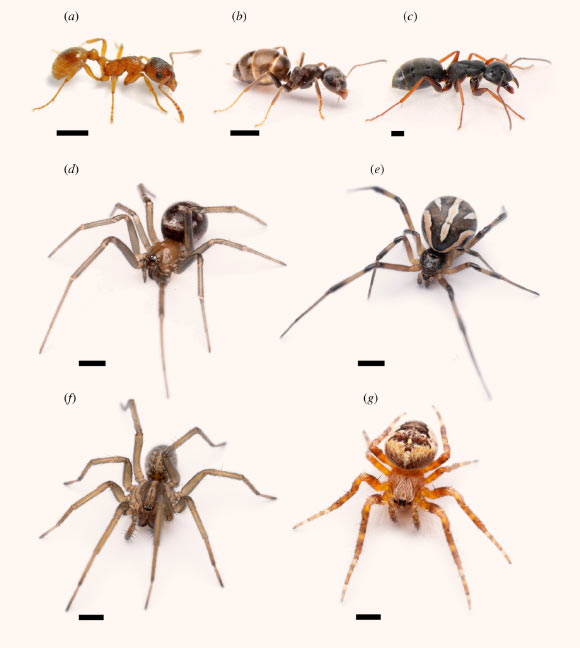Several species of spiders avoid building webs near European fire ants (Myrmica rubra) by sensing the chemicals they give off in the environment, according to new research.

Photographs of worker ants of Myrmica rubra (a), Lasius niger (b) and Camponotus modoc (c) that were used to prepare test stimuli, and of subadult female spiders of Steatoda grossa (d), Latrodectus hesperus (e), Eratigena agrestis (f) and Araneus diadematus (g) that were tested in lab experiments. Scale bar – 1 mm. Image credit: Fischer et al., doi: 10.1098/rsos.210279.
Many ants prey on spiders, suggesting that web-building spiders may avoid micro-locations near ant colonies or frequented by foraging ants.
Simon Fraser University Ph.D. candidate Andreas Fischer and colleagues hypothesized that spiders instinctively know to avoid building webs in these danger areas by sensing chemical cues left behind by predatory ants.
As model organisms for the study, the researchers selected three ant species: European fire ants (Myrmica rubra), black garden ants (Lasius niger), and western carpenter ants (Camponotus modoc).
To generate stimuli, they exposed filter paper for 12 hours to workers of these ants and then offered select four web-building spider species — the false black widow (Steatoda grossa), the black widow (Latrodectus hesperus), the hobo spider (Eratigena agrestis), and the cross spider (Araneus diadematus), all of which are commonly found in and around human dwellings in North America — in three-chamber bioassays a choice between ant-exposed filter paper and unexposed control filter paper.
They found that the chemical deposits of European fire ants specifically, which are known to be aggressive omnivorous scavengers and prey on many invertebrates, had a deterrent effect on all tested spider species.
The spiders chose to stay in the chamber that had no chemical trace of ants nearby.
“Given how much time and energy spiders put into building their webs, it makes sense that spiders in the wild would pick locations that have fewer threats to their survival,” Fischer said.
“Meanwhile, people’s fear of spiders has led to the development of many insecticides and other chemical products that claim to repel spiders.”
“But most of them have proven largely ineffective because spiders are able to abandon their webs and rebuild elsewhere.”
“Harnessing the natural chemicals given off by their natural predators could help create more effective repellents for homeowners.”
The study was published in the journal Royal Society Open Science.
_____
Andreas Fischer et al. 2021. Know your foe: synanthropic spiders are deterred by semiochemicals of European fire ants. R. Soc. open sci 8 (5): 210279; doi: 10.1098/rsos.210279







